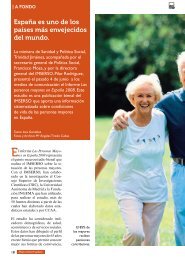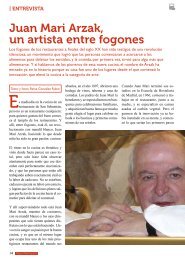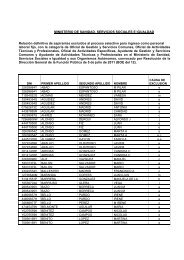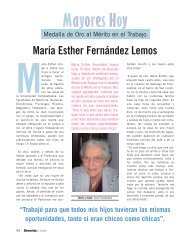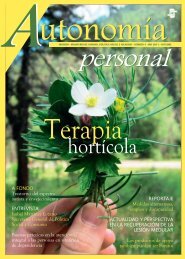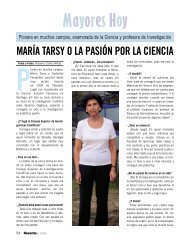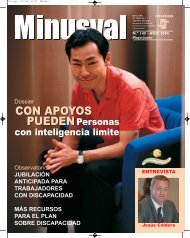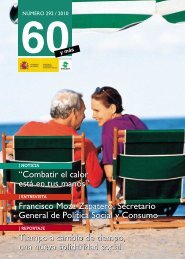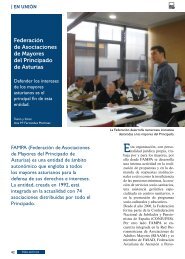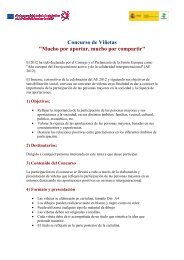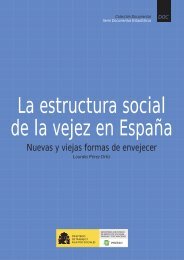- Page 1 and 2:
Los tiempos del cuidado Colección
- Page 3 and 4:
Colección Estudios Serie Dependenc
- Page 5 and 6:
LOS TIEMPOS DEL CUIDADO 4 2. Las di
- Page 7 and 8:
LOS TIEMPOS DEL CUIDADO 6 a. La dis
- Page 9 and 10:
LOS TIEMPOS DEL CUIDADO 8 Debe ente
- Page 12:
Introducción y objetivos
- Page 15 and 16:
LOS TIEMPOS DEL CUIDADO 14 1. Cuant
- Page 18:
Capítulo 1. Marco conceptual: el c
- Page 21 and 22:
LOS TIEMPOS DEL CUIDADO 20 la proli
- Page 23 and 24:
LOS TIEMPOS DEL CUIDADO 22 en la ap
- Page 25 and 26:
LOS TIEMPOS DEL CUIDADO 24 producid
- Page 27 and 28:
LOS TIEMPOS DEL CUIDADO 26 determin
- Page 29 and 30:
LOS TIEMPOS DEL CUIDADO 28 Activida
- Page 31 and 32:
LOS TIEMPOS DEL CUIDADO 30 A pesar
- Page 33 and 34:
LOS TIEMPOS DEL CUIDADO 32 Nota: m
- Page 35 and 36:
LOS TIEMPOS DEL CUIDADO 34 con impo
- Page 37 and 38:
LOS TIEMPOS DEL CUIDADO 36 Las rede
- Page 39 and 40:
LOS TIEMPOS DEL CUIDADO 38 contrapr
- Page 41 and 42:
LOS TIEMPOS DEL CUIDADO 40 dirigida
- Page 43 and 44:
LOS TIEMPOS DEL CUIDADO 42 1. Los d
- Page 45 and 46:
LOS TIEMPOS DEL CUIDADO 44 1. Las p
- Page 47 and 48:
LOS TIEMPOS DEL CUIDADO 46 En la ac
- Page 49 and 50:
LOS TIEMPOS DEL CUIDADO 48 La estim
- Page 51 and 52:
LOS TIEMPOS DEL CUIDADO 50 El princ
- Page 53 and 54:
LOS TIEMPOS DEL CUIDADO 52 En toda
- Page 55 and 56:
LOS TIEMPOS DEL CUIDADO 54 D. LA DE
- Page 57 and 58:
LOS TIEMPOS DEL CUIDADO 56 4. LAS C
- Page 59 and 60:
LOS TIEMPOS DEL CUIDADO 58 Desarrol
- Page 61 and 62:
LOS TIEMPOS DEL CUIDADO 60 FIGURA 1
- Page 63 and 64:
LOS TIEMPOS DEL CUIDADO 62 Según e
- Page 65 and 66:
LOS TIEMPOS DEL CUIDADO 64 En la ac
- Page 68:
Capítulo 2. Las dimensiones del pr
- Page 71 and 72:
LOS TIEMPOS DEL CUIDADO 70 70 60 50
- Page 73 and 74:
LOS TIEMPOS DEL CUIDADO 72 Asumiend
- Page 75 and 76:
LOS TIEMPOS DEL CUIDADO 74 FIGURA 2
- Page 77 and 78:
LOS TIEMPOS DEL CUIDADO 76 1993). L
- Page 79 and 80:
LOS TIEMPOS DEL CUIDADO 78 2. La re
- Page 81 and 82:
LOS TIEMPOS DEL CUIDADO 80 dos: pri
- Page 83 and 84:
LOS TIEMPOS DEL CUIDADO 82 N % Sól
- Page 85 and 86:
LOS TIEMPOS DEL CUIDADO 84 TABLA 2.
- Page 87 and 88:
LOS TIEMPOS DEL CUIDADO 86 papel de
- Page 89 and 90:
LOS TIEMPOS DEL CUIDADO 88 FIGURA 2
- Page 91 and 92:
LOS TIEMPOS DEL CUIDADO 90 TABLA 2.
- Page 93 and 94:
LOS TIEMPOS DEL CUIDADO 92 personal
- Page 96 and 97:
“Ocurre con frecuencia que los ma
- Page 98 and 99:
2. LA INVESTIGACIÓN SOBRE TRABAJO
- Page 100 and 101:
La evolución reciente del trabajo
- Page 102 and 103:
La condensación de tiempo es desig
- Page 104 and 105:
vida diaria informan sobre las dife
- Page 106 and 107:
Española (RTVE) realiza dos estudi
- Page 108 and 109:
TABLA 3.1. Horas dedicadas al cuida
- Page 110 and 111:
La consolidación del cuidado infor
- Page 112 and 113:
exclusión de un determinado derech
- Page 114 and 115:
han sido institucionalizados por su
- Page 116:
FIGURA 3.5. Fases en el diseño y a
- Page 120 and 121:
“La enfermedad es un huésped no
- Page 122 and 123:
La falta de armonía en la familia
- Page 124 and 125:
La dimensión temporal es un elemen
- Page 126 and 127:
Transición Estabilidad Fuente: ela
- Page 128 and 129:
La idea misma de discapacidad está
- Page 130 and 131:
Cuando los mayores delegan la toma
- Page 132 and 133:
C. OTROS CUIDADORES Hay una pequeñ
- Page 134 and 135:
la familia de pertenencia no son de
- Page 136 and 137:
y sus hijas, con efectos positivos
- Page 138 and 139:
El cuidado formal se ha definido co
- Page 140 and 141:
y receptor. Aunque la relación de
- Page 142 and 143:
volumen del trabajo remunerado dedi
- Page 144 and 145:
literatura sobre cuidado ha expuest
- Page 146:
de los cuidadores influye en la cap
- Page 150 and 151:
“No todo lo que puede ser contado
- Page 152 and 153:
C. LA MEDICIÓN DEL CUIDADO Y SU IM
- Page 154 and 155:
Desde una perspectiva economicista,
- Page 156 and 157:
. Se trata de una metodología espe
- Page 158 and 159:
8. Los errores en cuestionarios aut
- Page 160 and 161:
Una de las principales dificultades
- Page 162 and 163:
diseño de la investigación, la fu
- Page 164 and 165:
fuente una referencia imprescindibl
- Page 166 and 167:
de 50 y más años de Dinamarca, Su
- Page 168 and 169:
entrevistas abiertas). Gran parte d
- Page 170 and 171:
El sexto objetivo persigue conocer
- Page 172 and 173:
e) Identifican el tipo de cuidado q
- Page 174 and 175:
TABLA 5.3. Cuidado formal recibido
- Page 176 and 177:
Variables Se analiza la distribuci
- Page 178 and 179:
La EET permite estudiar cómo los m
- Page 180 and 181:
obtener un mapa más o menos fiable
- Page 182 and 183:
TABLA 5.8. Razones por las que otro
- Page 184 and 185:
de investigaciones. La Encuesta de
- Page 186:
espuesta. No es posible, por tanto,
- Page 190:
Capítulo 6. Volumen y distribució
- Page 193 and 194:
LOS TIEMPOS DEL CUIDADO 192 2006: 5
- Page 195 and 196:
LOS TIEMPOS DEL CUIDADO 194 90 80 7
- Page 197 and 198:
LOS TIEMPOS DEL CUIDADO 196 100 90
- Page 199 and 200:
LOS TIEMPOS DEL CUIDADO 198 igual p
- Page 201 and 202:
LOS TIEMPOS DEL CUIDADO 200 Los may
- Page 203 and 204:
LOS TIEMPOS DEL CUIDADO 202 informa
- Page 205 and 206:
LOS TIEMPOS DEL CUIDADO 204 Además
- Page 207 and 208:
LOS TIEMPOS DEL CUIDADO 206 combina
- Page 209 and 210:
LOS TIEMPOS DEL CUIDADO 208 TABLA 6
- Page 211 and 212:
LOS TIEMPOS DEL CUIDADO 210 Modelo
- Page 213 and 214:
LOS TIEMPOS DEL CUIDADO 212 Modelo
- Page 215 and 216:
LOS TIEMPOS DEL CUIDADO 214 FIGURA
- Page 217 and 218:
LOS TIEMPOS DEL CUIDADO 216 Los may
- Page 219 and 220:
LOS TIEMPOS DEL CUIDADO 218 formal
- Page 221 and 222:
LOS TIEMPOS DEL CUIDADO 220 Es más
- Page 223 and 224:
LOS TIEMPOS DEL CUIDADO 222 TABLA 6
- Page 225 and 226:
LOS TIEMPOS DEL CUIDADO 224 Aunque
- Page 227 and 228:
LOS TIEMPOS DEL CUIDADO 226 se mues
- Page 229 and 230:
LOS TIEMPOS DEL CUIDADO 228 mujeres
- Page 231 and 232:
LOS TIEMPOS DEL CUIDADO 230 14. Las
- Page 234:
Capítulo 7. Los hogares cuidadores
- Page 237 and 238:
LOS TIEMPOS DEL CUIDADO 236 racteri
- Page 239 and 240:
LOS TIEMPOS DEL CUIDADO 238 El cuid
- Page 241 and 242:
LOS TIEMPOS DEL CUIDADO 240 En el 3
- Page 243 and 244:
LOS TIEMPOS DEL CUIDADO 242 convive
- Page 245 and 246:
LOS TIEMPOS DEL CUIDADO 244 La mita
- Page 247 and 248:
LOS TIEMPOS DEL CUIDADO 246 100% 80
- Page 249 and 250:
LOS TIEMPOS DEL CUIDADO 248 expuest
- Page 251 and 252:
LOS TIEMPOS DEL CUIDADO 250 Probabi
- Page 253 and 254:
LOS TIEMPOS DEL CUIDADO 252 No ocup
- Page 255 and 256:
LOS TIEMPOS DEL CUIDADO 254 resiste
- Page 257 and 258:
LOS TIEMPOS DEL CUIDADO 256 N: 218
- Page 259 and 260:
LOS TIEMPOS DEL CUIDADO 258 Recibe
- Page 261 and 262:
LOS TIEMPOS DEL CUIDADO 260 conocid
- Page 263 and 264:
LOS TIEMPOS DEL CUIDADO 262 2. Los
- Page 266:
Capítulo 8. La dimensión temporal
- Page 269 and 270:
LOS TIEMPOS DEL CUIDADO 268 Según
- Page 271 and 272:
LOS TIEMPOS DEL CUIDADO 270 FIGURA
- Page 273 and 274:
LOS TIEMPOS DEL CUIDADO 272 25 20 1
- Page 275 and 276:
LOS TIEMPOS DEL CUIDADO 274 25 20 1
- Page 277 and 278:
LOS TIEMPOS DEL CUIDADO 276 Los cui
- Page 279 and 280:
LOS TIEMPOS DEL CUIDADO 278 atiende
- Page 281 and 282:
LOS TIEMPOS DEL CUIDADO 280 Mujer V
- Page 283 and 284:
LOS TIEMPOS DEL CUIDADO 282 TABLA 8
- Page 285 and 286:
LOS TIEMPOS DEL CUIDADO 284 Los úl
- Page 287 and 288:
LOS TIEMPOS DEL CUIDADO 286 pertene
- Page 289 and 290:
LOS TIEMPOS DEL CUIDADO 288 Los cui
- Page 291 and 292:
LOS TIEMPOS DEL CUIDADO 290 100% 90
- Page 293 and 294:
LOS TIEMPOS DEL CUIDADO 292 Puede p
- Page 295 and 296:
LOS TIEMPOS DEL CUIDADO 294 la mism
- Page 297 and 298: LOS TIEMPOS DEL CUIDADO 296 Estos r
- Page 299 and 300: LOS TIEMPOS DEL CUIDADO 298 2. Exis
- Page 301 and 302: LOS TIEMPOS DEL CUIDADO 300 gran ca
- Page 304: Capítulo 9. Motivaciones y satisfa
- Page 307 and 308: LOS TIEMPOS DEL CUIDADO 306 que no
- Page 309 and 310: LOS TIEMPOS DEL CUIDADO 308 TABLA 9
- Page 311 and 312: LOS TIEMPOS DEL CUIDADO 310 El cón
- Page 313 and 314: LOS TIEMPOS DEL CUIDADO 312 El 27,4
- Page 315 and 316: LOS TIEMPOS DEL CUIDADO 314 100% 90
- Page 317 and 318: LOS TIEMPOS DEL CUIDADO 316 TABLA 9
- Page 319 and 320: LOS TIEMPOS DEL CUIDADO 318 A pesar
- Page 321 and 322: LOS TIEMPOS DEL CUIDADO 320 El cuid
- Page 323 and 324: LOS TIEMPOS DEL CUIDADO 322 aquello
- Page 325 and 326: LOS TIEMPOS DEL CUIDADO 324 3. CONC
- Page 327 and 328: LOS TIEMPOS DEL CUIDADO 326 lugar e
- Page 330 and 331: “El cuidado es lo que permite la
- Page 332 and 333: Dado que el cuidado informal contin
- Page 334 and 335: Asimismo, el acceso a la informaci
- Page 336 and 337: 2. APUNTES PARA EL FUTURO DE LA INV
- Page 338: Bibliografía y fuentes estadístic
- Page 341 and 342: LOS TIEMPOS DEL CUIDADO 340 Bazo, M
- Page 343 and 344: LOS TIEMPOS DEL CUIDADO 342 Chappel
- Page 345 and 346: LOS TIEMPOS DEL CUIDADO 344 Eco, U.
- Page 347: LOS TIEMPOS DEL CUIDADO 346 Herlitz
- Page 351 and 352: LOS TIEMPOS DEL CUIDADO 350 ONU (20
- Page 353 and 354: LOS TIEMPOS DEL CUIDADO 352 Ramos P
- Page 355 and 356: LOS TIEMPOS DEL CUIDADO 354 Starrel
- Page 357 and 358: LOS TIEMPOS DEL CUIDADO 356 FUENTES
- Page 360 and 361: ÍNDICE DE TÉRMINOS CAPACIDAD DE A
- Page 362 and 363: ÍNDICE DE SIGLAS AAVD: Actividades
- Page 364 and 365: ÍNDICE DE TABLAS Tabla 1.1. Tipos
- Page 366 and 367: Tabla 7.4. Modelo de regresión log
- Page 368 and 369: ÍNDICE DE FIGURAS Figura 1.1. Fact
- Page 370 and 371: Figura 7.10. Relación con respecto
- Page 372 and 373: TABLAS Y FIGURAS NO INCLUÍDAS TABL
- Page 374 and 375: TABLA A.6.1. Diferencias de tiempo
- Page 376 and 377: TABLA A.8.3. Razón para no cuidar:
- Page 378 and 379: Nº ITEMS Nunca (0) 7 ¿Siente que
- Page 380 and 381: Mujer 0% FIGURA A.6.3. Distribució
- Page 382 and 383: Cónyuge mujer Cónyuge varón 0% F
- Page 384: COLECCIÓN ESTUDIOS SERIE DEPENDENC



